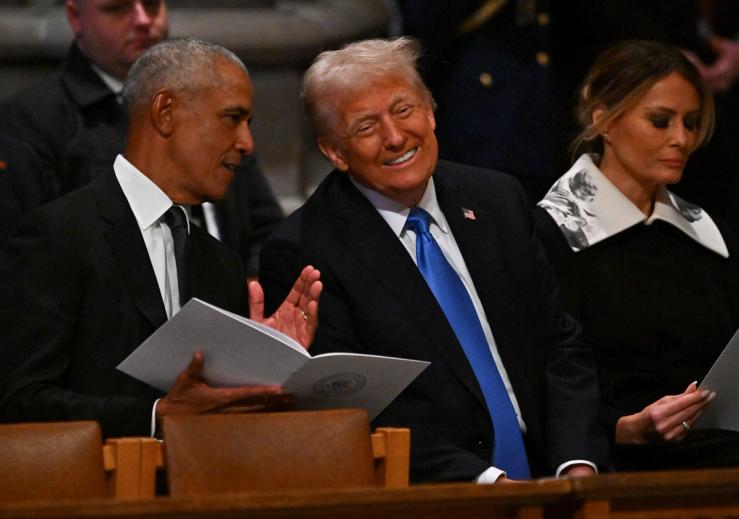The News
With the progressive “resistance” quiet ahead of Donald Trump’s second term, congressional Democrats are making their own shift: They’re turning away from past portrayals of Trump as a human wrecking ball and toward more potential collaboration.
After ignoring a Republican crackdown on undocumented immigration for months last year, Senate Democrats holstered their filibuster power on Thursday and prepared to work on the bill — which Trump could end up signing into law thanks to their support. Democrats are currently debating whether to also advance a GOP plan to debate sanctions on the International Criminal Court for targeting Israeli leaders with arrest warrants.
On top of that, several Democrats met this week with Robert F. Kennedy Jr., whose nomination as Trump’s health secretary could eventually become a partisan battle given Kennedy’s vaccine skepticism and other unconventional views. Senate Democrats are unlikely to bear hug most of Trump’s nominees beyond their colleague Marco Rubio and a handful of others, but they’re making clear they’ll at least meet with the president-elect’s most polarizing picks.
“It’s just accepting the reality that Trump won. And us just saying he’s a chaotic guy goes nowhere. That’s just baked into people’s consciousness,” Sen. Peter Welch, D-Vt., told Semafor of the party’s strategy. “The fact is, people want change. So that means we have to be willing to change as well.”
Democrats are now experiencing the disorienting challenge that Republicans did four years ago after Biden and his party took complete control of Washington. For the first two years of Biden’s term, Republicans briefly shelved hyper-partisanship and collaborated to a surprising degree with Democrats on infrastructure, gun safety, same-sex marriage and microchip manufacturing.
It’s too early to say that Trump’s presidency will end up with the same number of bipartisan policymaking victories — he squandered several opportunities during his first term to address immigration, background checks for gun buyers and roads and bridges. Yet it’s clear that Democrats are not looking to play the role of early obstructionists the way they did when Trump first took office; instead, they’re looking to disarm GOP attacks that they are soft on Israel and the border.
Some of them are even open to engaging in conversations with the GOP on bigger border security moves as well as tax cuts, the two central pieces of Trump’s Hill agenda.
Still, they’re also digging in for a potentially huge fight later over taxes on the wealthy and corporations, Trump’s tariffs and perhaps his deportation agenda. But now that Trump can’t run for president again, Democrats are no longer building their political strategy around highlighting his most erratic comments.
When Trump said this week he wanted to rename the Gulf of Mexico, for example, Senate Minority Leader Chuck Schumer sarcastically quipped that he first must work with Democrats on lowering consumer prices.
“We’ve seen the movie … eight years ago. It was all a surprise to us,” said Sen. Tim Kaine, D-Va. “Now we know the basic playbook.”
Kaine said his experience in the minority during Trump’s first term has him steeled for multitasking: “On a given day, I’m doing both things: Trying to get things passed, and also trying to stop bad things from happening.”
In this article:
Know More
Just a few days ago, some Republicans expected Democrats to block the Laken Riley Act, which would detain immigrants who entered the country illegally when they are accused of theft-related crimes. Instead Sen. John Fetterman, D-Pa., helped Sen. Katie Britt, R-Ala., whip up surprising support from his party.
“I’m thinking they’re listening to the American public better, or paying attention to what’s actually happening on the ground,” said Sen. Shelley Moore Capito, R-W.Va., a member of party leadership who was also in the middle of some of those Biden-era deals.
She said she’s “surprised” at the early cooperation but skeptical of where it ultimately goes: “I wouldn’t say this is going to be a marker of a fully cooperating minority, no.”
If Trump leads Republicans fully into party-line policymaking after the Laken Riley and ICC bills, it could quickly chill the bipartisanship in the Senate. Already Majority Leader John Thune announced the chamber will vote on conservative abortion legislation later this month, and many of Trump’s nominees will get few Democratic votes.
Democrats are already amping up their attacks on top Republicans for moving Trump nominees through Senate committees before proper vetting is complete.
Still, it’s just as possible that Democrats try to maintain their current bipartisan energy for as long as possible. Sen. Mark Kelly, D-Ariz., said he’s hoping to restart aisle-crossing border negotiations with Republicans, which could chill their effort to move a border spending bill through the party-line budget reconciliation process.
And Sen. John Hickenlooper, D-Colo., said he’d be interested in entering into tax talks with Republicans — so long as they set up guardrails against giving tax breaks to the wealthy.
“Within that, there’s a million things that need to be decided. So I’d be happy to try and find compromises wherever possible,” Hickenlooper told Semafor.
The View From The Left
Progressive Democrats are loath to describe their approach as fully conciliatory.
Sen. Ed Markey, D-Mass., is one of the more than half-dozen Democrats meeting with Kennedy this week. He said he has “serious reservations” about the health secretary nominee’s views, though he was “willing to take the meeting.”
“I’m willing to meet with all nominees. I met with the nominee for Secretary of Education [Tuesday], even though Trump is calling for the abolition of the Department of Education,” Markey told Semafor.
Burgess’s view
Democrats are still getting back their footing after their November shellacking, which handed Republicans total control of government for the first time since the end of 2018. They’ve conspicuously shied away from bombastic attacks on Trump and his nominees, preferring to let Republicans answer for any controversy and keeping the majority party guessing about where they might land on legislation.
There are early signs that, as Trump’s Cabinet nominees head into their hearings next week, Democrats will browbeat them for their views and for their fealty to the president-elect. And if Republicans, as expected, pursue much of their agenda without Democratic votes, the minority party will fight back.
It might just sound more like a policy argument than an anti-Trump one.
“There’ll be plenty of opportunities for us to fight on matters of real principle, where our argument is that that’s going to make life harder and more expensive for people,” Welch said. “But not just because we don’t like Trump.”


